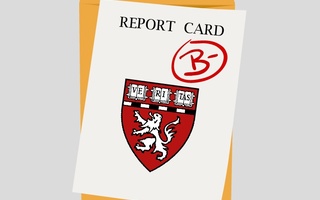George Q. Daley ’82, the new dean of Harvard Medical School, introduced a task force intended to make the school more diverse and expressed concern about the “uncertainty” of federal research funding at a town hall event Tuesday.
In light of recent calls to increase diversity at Medical School and the creation of an University-wide task force on diversity, Daley—who became dean of the school earlier this month—announced that the Medical School will create a similar school-specific task force. Dean of Diversity at the Medical School Joan Y. Reede will assemble the task force, which will seek a “stronger and deeper evaluation of the issues we are confronting,” Daley said.{shortcode-e3a0f5db06a9ea520373998d5a605f61daf2cd5d}
Last February, a group of roughly 40 Medical Students delivered a petition to Massachusetts Hall urging University President Drew G. Faust to interview candidates from underrepresented minorities in medicine and choose a Medical School dean who would commit to increasing campus diversity. Medical School activists also drafted a “social justice agenda” for the new dean last year, requesting more student involvement in faculty search committees, among other initiatives.
“The point is that I need to be hearing directly from you in order to better understand you, to listen to your needs and aspirations,” Daley said at the meeting, which drew more than 100 people to the Joseph B. Martin conference center in Boston.
At the meeting, Daley also said that transitions of power in the government and “mounting concerns” over diminishing federal research funding may adversely affect the Medical School. As a result, Daley said, seeking out private sources of research funding would be a priority of his tenure.
“Our best way to counteract these negative trends are the quality of our faculty and our students and the impact of our scientists,” Daley said. “What better way than to attract investment than to focus on our continuing scientific excellence?”
Daley also said that unlike other medical institutions, the Medical School lacks a center for social interaction. He pledged to host more informal social events at Gordon Hall.
“Social gatherings directly translate into intellectual, scientific, and entrepreneurial opportunities,“ Daley said. “I want to revive the tradition of bringing people together under casual circumstances to incubate great ideas.”
Additionally, Daley said he wants to extend intellectual collaboration beyond the Medical School by planning a series of events which would bring scientists and practitioners with common goals and interests together.
Daley, who was named dean in August, joined the Medical School faculty in 1995. At the meeting, Daley, who also attended the school, said that he was “deeply entrenched here at HMS” and “fiercely loyal to the institution.”
“It’s my hope that I can infect all of you with my sense of pride for this place,” Daley said to the audience. He emphasized the need for “transparent” and “candid” communication in the process in which others can feel “comfortable to criticize and speak out against problems.”
Harvard Stem Cell and Regenerative Biology Director M. William “Willy” Lensch will serve as the Medical School’s Chief of Staff.
Several audience members said they were impressed by Daley’s presentation.
“I think Dean Daley gave a very clear account on what he will do and I think he means what he said,” Jeantine E. Lunshof, a visiting fellow in genetics at the Medical School, said. “This is what the school needs at the moment.”
Alexander Miamen, a graduate student at the Medical School, described Daley’s speech as “reassuring” and “inspiring.”
“Now, we are waiting to see implementation,” Miamen said.
—Staff writer William L. Wang can be reached at william.wang@thecrimson.com.Read more in University News
Harvard to Launch Search for New Title IX Officer
















